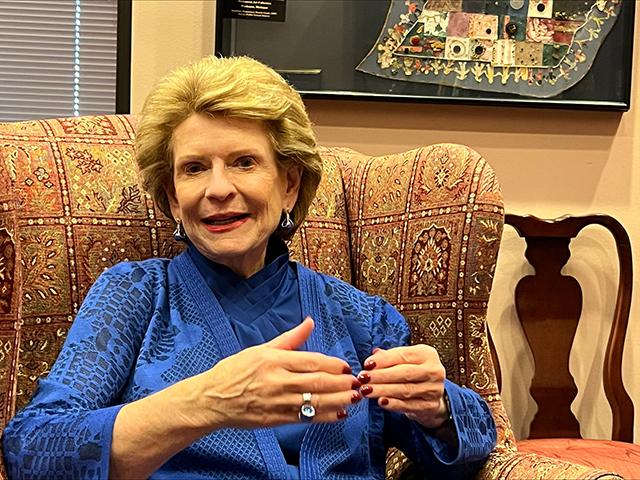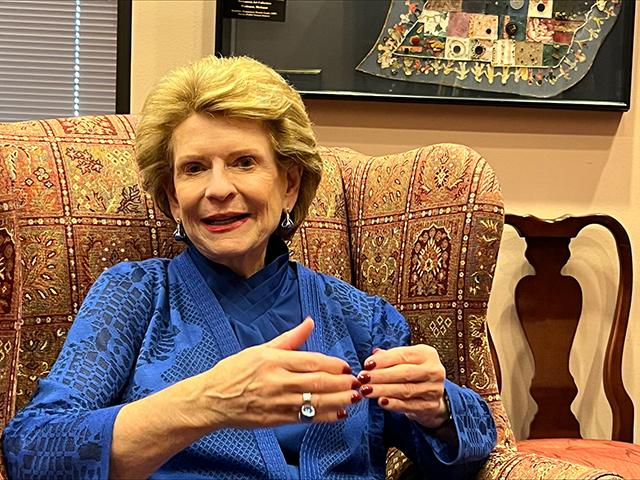Ag Policy Blog
New Trade, Foreign Aid Dollars From USDA Check Boxes on Stabenow's Farm Bill List
WASHINGTON (DTN) -- At some point this week, Agriculture Secretary Tom Vilsack is expected to announce USDA will tap the Commodity Credit Corp (CCC) to add significant funding for trade promotion and international food aid during the next five years.
Senate Agriculture Committee Chairwoman Debbie Stabenow, D-Mich., in an interview with DTN last week, said she is pleased USDA will respond to a letter from herself and Sen. John Boozman, R-Ark., ranking member of the committee.
The extra dollars out of the Agriculture Secretary's Commodity Credit Corp will help relieve some of the pressure facing lawmakers crafting a new farm bill. Commodity groups that have clamored for years that USDA's major trade programs need more dollars to help market U.S. products in an increasingly competitive global export market.
"We don't have the resources to just do this through the farm bill baseline," Stabenow said.
The boost in international farm aid is critical, too, though the proposed House funding bill for USDA would trim or eliminate funds for some of the department's foreign aid spending.
Stabenow has been involved in six farm bills and this is the third she has led, and this one so far appears to be the most complicated.
"Unfortunately, the politics around the Inflation Reduction Act make it more difficult for people to see how this is just a big win for farmers," she said. "Then you get not the politics around nutrition as well."
The senator operates with patience, looking for a bi-partisan agreement that also satisfies the different regions of the country. And while the GOP-led House is searching for budget cuts across the federal government, Stabenow is looking for more funds to deal with the broad range of demands and requests across farm bill programs. That's why she is excited USDA can spend some CCC dollars to help boost trade promotion, helping support the Market Access Program and the Foreign Market Development Program.
"Every single group came in and said they wanted to double the amount of the Market Access Program and foreign access programs," said Stabenow, who is crafting her last farm bill with her announcement she will not run for re-election next year.
REFERENCE PRICE INCREASE A BIG LIFT
Stabenow has repeatedly stressed her focus to increase trade promotion, expand crop insurance options and protect the conservation dollars from the Inflation Reduction Act. Asked about reference prices, Stabenow noted only 20 commodities are part of those programs while there are 130 different crops that have access to crop insurance.
"I'm supportive of doing something on reference prices, but the kinds of numbers being talked about are very challenging in terms of finding the dollars," she said.
P[L1] D[0x0] M[300x250] OOP[F] ADUNIT[] T[]
Also, because of the higher prices for producers in recent years, the commodity programs --Agricultural Risk Coverage and Price Loss Coverage (ARC and PLC) -- have paid out less in recent years. That basically caused the Congressional Budget Office to project $4.6 billion less in spending for the commodity title during the next decade. That makes it even harder to raise reference prices, Stabenow said.
Republicans, backed by commodity groups, want that boost in reference prices. Sen. Tommy Tuberville, R-Ala., a first-term senator on the Ag Committee, on the Senate floor last week noted this farm bill will be the first to score more than $1 trillion in costs. He said there was little funding in the farm bill compared to food aid and other programs. Pointing to higher farm expenses, he complained about the lack of focus on raising reference prices.
"The only thing that's keeping our farmers afloat is called the farm safety net. But the current support levels for Title 1 commodity programs like cotton, peanuts, and soybeans are not high enough to sustain our farmers for over the next five years," Tuberville said.
He added, "If we don't raise these reference prices, and right now my colleagues on the left don't want to raise those reference prices for our farmers, we're going to be buying all of our food and everything that we eat from other countries."
ASKING LEADERS FOR MORE DOLLARS
Recognizing the issues with raising reference prices, Stabenow said, "We should not underestimate the rest of the farm in the farm bill, which is crop insurance, trade, market access loans and research. Everything is a part of supporting farmers."
Despite the critics on crop insurance, Stabenow noted farm groups have stressed that protecting crop insurance is a priority. Stabenow said she thinks more can be done to lower the costs and broaden the coverage for farmers. "We can do some things to lower crop insurance costs for people," she said.
Pointing to more than $90 billion in ad-hoc aid tied to trade wars, COVID-19 and weather disasters, Stabenow said some of those calls for annual disaster aid could be dialed back with better crop insurance options. Improved use of conservation to help manage droughts and floods would help as well.
"That's why the conservation programs are so important going forward with the climate crisis," she said.
Stabenow said she has gone to Senate Majority Leader Chuck Schumer, D-N.Y., to ask for more funding for the farm bill. She stressed the farm bill is important for the 20% of people who live in rural America.
"He's committed to find some additional dollars to put in, but it's not unlimited. He has committed for the first time to doing that, and it will take bipartisan support do that. The reason I'm telling you that is I am looking for every way to be as creative as we can to do what I think is important."
Beyond farm subsidies, Stabenow acknowledged some frustration trying to boost funding for USDA and university research programs, which also have declined in value over time. Despite the criticisms of nutrition spending, Stabenow pointed out people on the Supplemental Nutrition Assistance Program (SNAP) saw temporary support dialed back earlier this year. That's led to more pressure on food banks as well as school lunches. Food aid was dialed back as food inflation continues to rise. Still, lawmakers continue to try to squeeze people and dollars out of nutrition programs.
"We're seeing a lot of people struggling with food prices going up," Stabenow said. "There's still a huge need out there for people right now. It's why we can't go backwards. I won't let that happen."
SUBSIDY CRITICS: DON'T RAISE REFERENCE PRICES
While Tuberville offered his critique, the unique left-right coalition against farm subsidies also held court this past week. Pointing to the House fight over government spending, a group of environmental groups and anti-spending think tanks joined forces to call for tighter limits on farm subsidies and crop insurance.
Farm aid should focus on producers who truly need it, said Josh Sewell of Taxpayers for Common Sense. "It's simple for people who are seriously concerned with our debts and deficits," Sewell said.
Sewell called for putting "some guardrails" on crop insurance as well to tighten eligibility and the premium subsidies. He said wealthier farmers can still buy crop insurance without the premium subsidies.
"This is a way for lawmakers to tailor the subsidies to those who really need the assistance," Sewell said.
Scott Faber from Environmental Working Group agreed. "It makes no sense that we have no such limits on the crop insurance program," Faber said.
Bryan Riley, director of National Taxpayers Union's free trade initiative, noted the median income for full-time farm families is higher than the average family and commercial farm households have median net worth of more than $3 million.
"We just don't' think taxpayers should continue to subsidize successful, profitable and in some cases high-income farms," Riley said.
Pointing to reference prices, Nan Swift from the group R Steet Institute, said, "It's unclear why we are having a discussion on the Hill about increasing subsidies when there is no urge to do so."
Chris Clayton can be reached at Chris.Clayton@dtn.com
Follow him on X, formerly known as Twitter, @ChrisClaytonDTN
(c) Copyright 2023 DTN, LLC. All rights reserved.






Comments
To comment, please Log In or Join our Community .